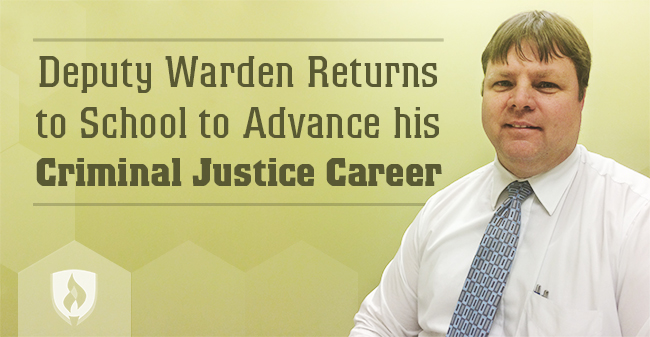Deputy Warden Returns to School to Advance His Criminal Justice Career
By Jennifer Pfeffer on 06/15/2015

It’s never too late to brush up on leadership skills and tactics to help you advance your career, says Paul Snyder, recent graduate of the Rasmussen College Human Resources and Organizational Leadership program in Topeka, Kansas.
In fact, Snyder believes attending college after a successful career is the perfect time.
"I am proof that anyone can go back to school & achieve a degree."
“A lot of people have different reservations about returning to school—even I originally believed that I was too old to make it work or it had been too long since I was last in school,” Snyder says. “But, I believe the life skills people gain in their jobs makes going back to college that much easier and is a greater benefit to them.”
Snyder says going back to college in his mid-40s was much easier than enrolling right after high school. He said he was able to apply his work experience to his studies, making his second attempt at college much easier than the first.
He also feels he retained more information this time around, and he liked how he could pick and choose what courses were most important to him and his career.
“At 45 years of age, I am proof that anyone can go back to school and achieve a degree,” Snyder says.
How a human resources degree helps in criminal justice
Snyder has spent 22 years in corrections and currently works as a deputy warden at the Wichita Work Release Facility within the Kansas Department of Corrections. Snyder returned to school when he began feeling stagnant in his job. After speaking to admissions representatives at the Rasmussen College Topeka campus, his perception changed and he learned earning a bachelor’s degree could help him be more competitive in the market.
“In my field, we are sometimes antiquated in our practices,” he says. “Rasmussen College opened my eyes to new ideas that I can apply to our current practices.”
Snyder says the organizational part of college has been invaluable to him in his career.
“There are lots of different processes and ways to analyze things,” Snyder says. “By going to college I learned more in depth why we do what we do; quantitative and qualitative approaches with management; how to make changes at the appropriate times; and ways to help your team be cooperative with each other.”
Snyder also attributes the critical thinking aspect of the program to being a better leader. He learned the importance of getting the team involved in decision making.
“It gives the staff something to own and fine tune,” he said.
Casting his own vision
Snyder hopes to become a warden in Kansas now that his degree has made him eligible for that position. He says he’ll apply the moment a position is posted.
"I feel a lot more confident making that next step in my career now that I've gone to college."
“You don’t have the ability to cast your own vision until you’re at the top,” Snyder says. “This whole time I’ve been getting better and better at sharing my visions for things, but if I were in charge I would be able to determine what I’d do in a particular situation and actually be able to do it.”
Of course, when Snyder gets to that point he will still have to follow state rules and regulations, but he’s looking forward to a time when he’ll have a little more autonomy to implement his own policies.
Once Snyder has retired from corrections, he plans to go back to work, but in a human resources capacity.
The Takeaway
Snyder is proof it’s never too late to better your future by earning a degree that will help you become more promotable at your current company, or help you to earn a better job at another company.
“I feel a lot more comfortable making that next step in my career now that I’ve gone to college,” Snyder says.
Are you ready to make that next step in your criminal justice career? Visit our School of Justice Studies page to learn how we can help!
Related Articles:




